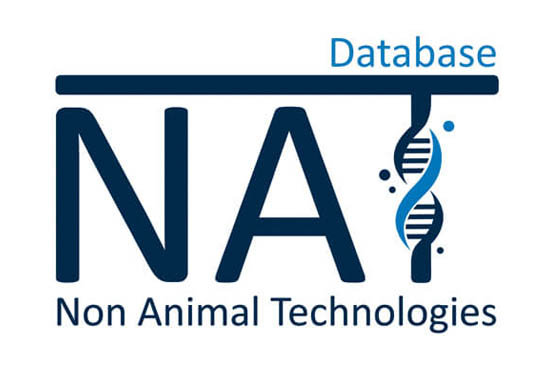NAT Database on non-animal technologies
On July 29th, 2020, our NAT database was launched with 250 entries describing animal-free research methods. To date, the number of entries has increased more than sevenfold to more than 1.800 entries. We proudly look back on a success story that makes a decisive contribution to avoiding animal testing and advancing animal-free research.
Nowadays, numerous modern animal-free research methods are readily available and the quantity of publications describing them is steadily increasing. However, this proliferation poses a challenge for scientists, decision-makers, and the interested public in efficiently finding these methods. Conventional literature databases are still dominated by animal-consuming research, causing animal-free methods to become overshadowed by animal experimentation studies. Consequently, the full potential of modern human-based research methods has not yet been exploited - countless animals continue to suffer and die in animal experiments, despite the existence of viable animal-free methods.
History oft he NAT database
The idea to develop the NAT database emerged 3 years ago, as such a platform did not yet exist. Our NAT database is the only one of its kind – worldwide. On the one hand, we are of course pleased about the uniqueness of our project. On the other hand, it is profoundly disappointing that governmental authorities have not yet ensured that such a database is available to the scientific community. It is essential to promote the availability of the existing non-animal research methods to successfully abolish animal experiments.
Such an overview holds immense value for scientists working in this field, for example, to identify cooperation partners who will help with the establishment of respective methods. The database is equally important for authorities and decision-makers. In order to reject animal testing applications, the responsible persons must have the opportunity to quickly and purposefully identify animal-free methods to be used instead. Neither at a federal level nor at an EU level has such a platform been established thus far.
At the end of 2020, a sum of €3 million was made available from the federal budget, which was intended to be used, among other things, to create such a database. So far, however, this has not been realized and only the so-called Federal Network 3R has been launched, which is a kind of general information platform on 3Rs (refinement, reduction, and replacement of animal experiments).
Hard work pays off
For this reason, our NAT database is of high importance and has achieved notable success. Since the launch, our scientific team has been working continuously to find and select new animal-free technologies to include into the database. This demands substantial effort. From the multitude of animal-free methods, those that are to be included into the database must first be selected. We ensure that different biomedical disciplines are represented (e.g., oncology or toxicology), as well as different models (e.g., 3-dimensional cell models or computer-based procedures). Our scientific team then writes a summary of the method. It is important to us that this is done in a highly accessible language, ensuring that persons without scientific background can understand the methods. In addition, references, contact persons, and the associated institutes at which the procedure has been developed are added. Since our NAT database is bilingual, all of this is done in German and English. Before a new method finally finds its way into the database, there is a final quality check in terms of content and language.
We are pleased that our hard work is recognized and finds supporters. For example, the database was supported by the Animal Protection Commissioner of Berlin with public funds. The funded project included, among other things, the incorporation of animal-free methods published by the European Centre for the Validation of Alternative Methods (ECVAM). ECVAM is part of the European Commission and has published a total of seven reports on animal-free models in biomedical research in the past 2 years. These contain thousands of animal-free procedures from various disciplines such as neurodegenerative diseases, respiratory diseases, breast cancer, cardiovascular diseases, or autoimmune diseases. Thanks to the funding by the State of Berlin, we were able to select hundreds of methods from these reports with the support of external partners and include them in the NAT database.
Our main goal is that the NAT database reaches as many people as possible, especially scientists and young scientists. It is therefore particularly pleasing and important that our NAT database has been integrated into the DBIS (Database Information System), i.e., it is available to students and faculty members at over at over 340 university libraries.
Awards
A significant achievement is the recent recognition of our NAT database with two awards: the international Lush Prize and the Lower Saxony Animal Welfare Prize.
27 February 2023, updated on 11 August 2023
Dr. Tamara Zietek



